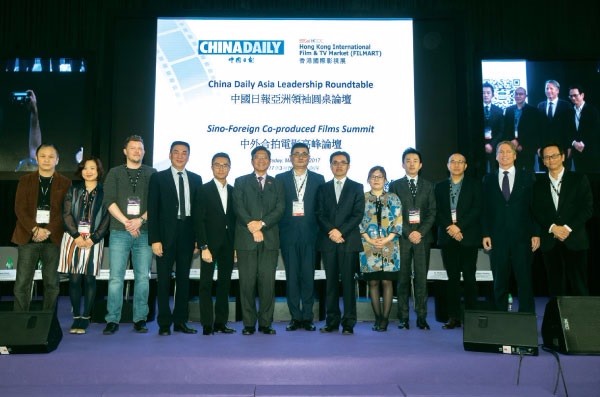2017-03-21
Chitralekha Basu

Cliched as it may sound, the aphorism “Content is king” emerged as one of the major takeaways from the China Daily-hosted Asia Leadership Roundtable on the theme of Sino-foreign co-productions held at the Hong Kong International Film and TV Market (FILMART) on Thursday. The panelists reiterated that while sharing of technology and skills are the two major thrust areas when it comes to co-productions, at the end of the day the key to their success lies in being able to tell a story that resonates across a wide swathe of audiences transcending national, and cultural, boundaries. The mood was upbeat at the panel discussion featuring eminent industry stalwarts — an illustrious film director, leaders of big-time film production companies, heavyweight producers of radio and television programs, among others. Indeed it was a moment worth celebrating the spectacular box-office takings of Chinese-foreign co-productions of the past year, as indeed it was of charting out a roadmap for the future. Editorial board member of China Daily Group and publisher and editor-in-chief at China Daily Asia Pacific Zhou Li remarked in his opening speech, 2016 has been a tremendous year for co-produced Chinese films, with Stephen Chow’s The Mermaid taking US$553.8 million at the box office, which makes it the highest-grossing Chinese film of all time. The film, a co-production between studios in the Chinese mainland and Hong Kong’s own Alibaba Pictures, has beaten the much-touted Hollywood mega project, the Zhang Yimou-directed The Great Wall, which despite having a star like Matt Damon in the lead, raked in only US$320 million. Telling tales Evidently, there was no sure-shot magic formula to tackle the unpredictable nature of box-office success — no fool-proof approach to arriving at cinema that might resonate across cultures, even when such experiments use actors, locations and stories that audiences from diverse backgrounds might identify with, as the Chinese audience’s lukewarm response to The Great Wall proves. However, the panelists almost unequivocally agreed that there was nothing to beat a good story, although sometimes it might take a bit of tweaking to appeal to an audience unfamiliar with the ethno-cultural references in the original. For instance, William Pfeiffer, executive chairman and co-founder of Globalgate Entertainment, drew attention to the very-successful run the Hong Kong-made film, Internal Affairs (2002) had enjoyed in its Hollywood avatar. “The story was so good that it was sold (to Warner Brothers) and remade as The Departed (2006) by Martin Scorsese and won the best picture Oscar.” Responding to producers such as Ann An, chairperson, Desen International Media, and Ya Ning, CEO, iQIYI Motion Pictures — who shared their experiences of dealing with the challenges of collaborating with overseas partners who did not speak the same language — Pfeiffer said, in 20 to 30 years, such constraints would likely be overcome with the aid of advanced technology. That’s when “actors speaking in Chinese might have the words come out in English, in their own voice”, he said. Kung Fu Panda 3, a Chinese-American co-production animation flick which raked in US$521.2 million last year, and finished among the top 10 highest-grossing films in China, is a fine example of working round the obvious limits of ethnicity and language. Here was a film with Hollywood luminary Guillermo del Toro as executive producer, featuring heavyweight stars such as Jack Black, Dustin Hoffman and Angelina Jolie, based on a Chinese story with Chinese sensibilities. Dagan Potter, the production lead at Oriental Dreamworks, revealed how the film’s massive American and Chinese crew, based in their offices in Los Angeles and Shanghai, would “discuss the merits of the film over two to three years”, sharing ideas and visions regarding the project. “If we were going to reinforce reality in fiction, who better than a crew having intimate knowledge of Chinese culture?” he added. He went on to describe how the film, originally made in English, “was re-animated to match the physical movements more natural to dialogues spoken in Mandarin”, for “making a film relatable to the local audience is an idea that we really want to push”. Ma Runsheng, former president of China Radio, Film and Television Program Exchange Center, lamented the diminishing presence of the big Chinese themes in the recent co-production endeavors involving Chinese investment. Emphasizing the cultural particularities that lend cinema its distinctive touch, Ma said, “The elements specific to Chinese culture are where our strengths lie and we should make use of advanced technology (harnessed from the partner country) to tell these great stories.” Source: http://www.chinadailyasia.com/2017-03/17/content_15587271.html